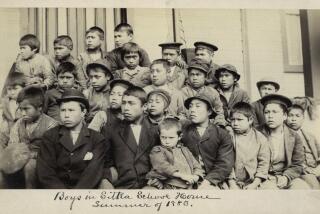Lessons from the dormitory
- Share via
There’s nothing like a boarding school to bring out the fevered obsessions of a group of people and turn their domain into a microcosm of the big, bad world -- at least in the movies.
In boarding-school movies, the most pressing problems of the world at that moment are distilled (or reduced) to the simplest human terms in a tightly controlled setting. Maybe it’s that petri-dish quality that brings out the behavior: the enclosed, closely monitored environment, usually fraught with repressive rules and conformist behavior. Who wouldn’t want to act out?
Not all boarding-school movies (not to be confused with the military-school subgenre) take a whack at social issues. Sometimes, they are character studies of the kind of outsize personality necessary to be a compelling teacher. Or they use the rigors of this disciplined academic setting as a backdrop for a coming-of-age story about a student who discovers some previously unknown truth about himself.
Just as often, these movies are the backdrop for the story of that fortuitous symbiosis between teacher and student: “The Emperor’s Club,” for example, looks at the relationship between a teacher and one student who makes a distinctive impression on him.
Still, for all the things that make these movies unique, there are a few conventions that pull them together in a world of their own.
*
(BEGIN TEXT OF INFOBOX)
(Text of table not included--Table compares these films: “Goodbye Mr. Chips” (1939);”Tea and Sympathy” (1956); “The Prime of Miss Jean Brodie” (1969); “Dead Poets Society” (1989); “School Ties” (1992); “Harry Potter and the Sorcerer’s Stone” (2001); “The Emperor’s Club”(2002))
More to Read
Only good movies
Get the Indie Focus newsletter, Mark Olsen's weekly guide to the world of cinema.
You may occasionally receive promotional content from the Los Angeles Times.








